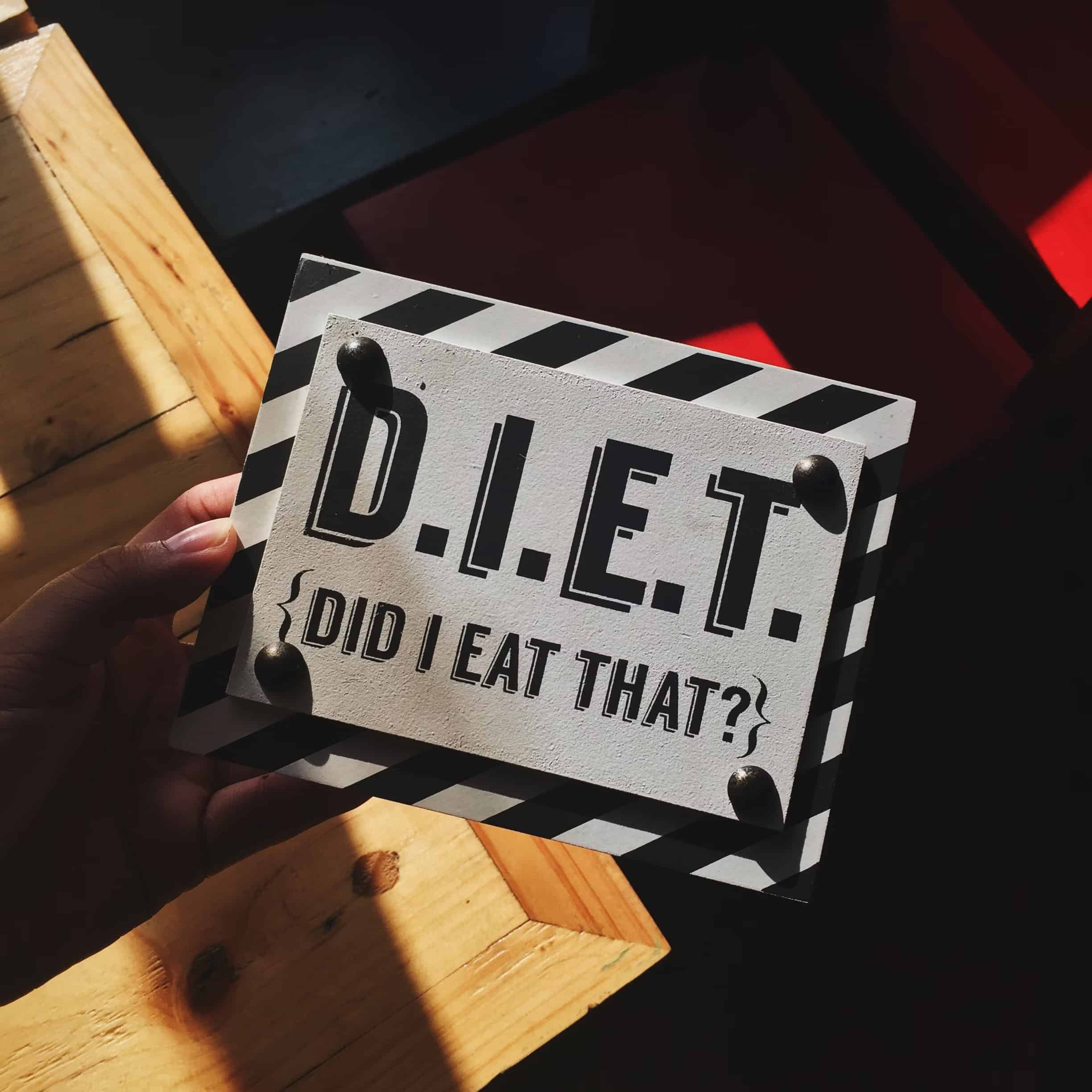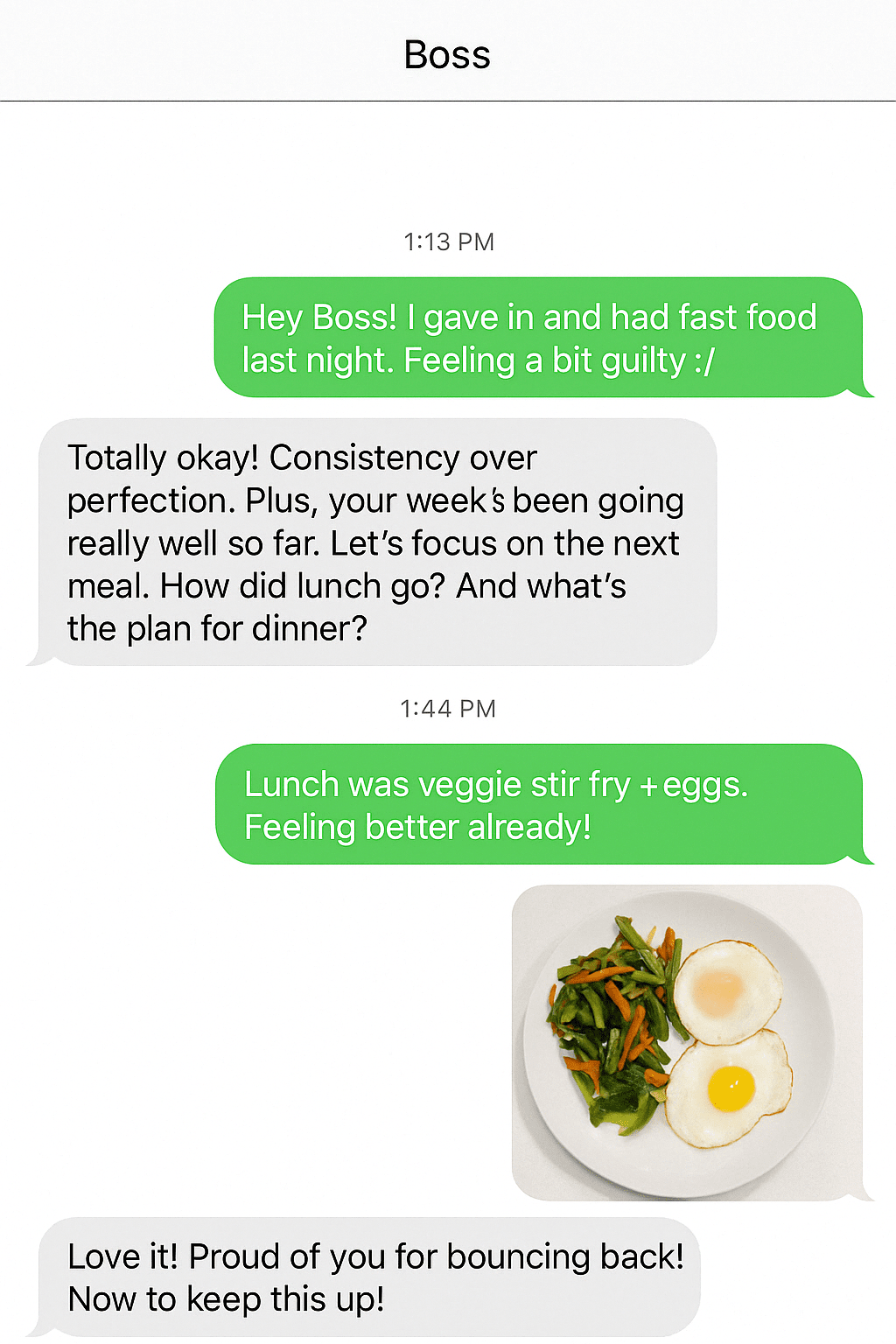How a Nutrition Accountability Coach Can Transform Your Health
Stay consistent, eat better, and see real results with the support of a nutrition accountability coach who keeps your goals on track.
I’ve given up on New Year’s resolutions.
Not because I don’t believe in self-improvement — I do. I just got tired of setting the same “eat healthy, exercise more, blah blah blah” goals every January... and then watching them quietly fizzle out by March (if I’m being generous).
It’s not that I don’t want to be healthy. I just never know exactly how. Nutrition is weirdly personal — it depends on your culture, your body, your lifestyle, eating habits, and that mysterious thing called metabolism. And every nutrition and weight loss expert seems to contradict the last: Carbs are the enemy! No wait, fat is! No wait, eat only celery and almonds!

Eventually, I gave up trying to figure it out on my own. This year, I’m calling in reinforcements: a nutrition accountability coach. Someone who’ll not only help me figure out what my nutrition goals should be — based on my actual life — but also (gently) nag me until I follow through, till I'm consistent. Bless them.
If you’ve been in the same confused, demotivated boat, this might be your sign. Let’s talk about what a nutrition or weight loss accountability coach actually does — and why it might just be the missing piece in your health puzzle.
What is Nutrition Accountability Coaching
Nutrition accountability coaching is a personalized approach to achieving our health goals, through customized guidance and support. It involves working with a certified coach who not just understands the theory of proper nutrition, but is also able to apply it in ways that suit their client. To put it another way, accountability coaching helps you set your own nutrition goals in a way that pretty much ensures you follow through on them.
The accountability aspect comes in after the goals are set. The greatest challenge in achieving wellness goals like nutrition is maintaining dedication and discipline. With a coach to keep you accountable, you are far more likely to stick to your plan and stay motivated enough to not cheat on your goals.
Benefits of Working with a Nutrition Accountability Coach
Personalized guidance and support
Food is personal. Some of us love spice, others can’t say no to dessert. Some skip meals, others snack like it’s a competitive sport.
That’s why generic diet plans so often fail — they’re not built for you.
With a nutrition accountability coach, you get advice that fits your lifestyle, preferences, and challenges. Whether you struggle with portion control, mindless snacking, or emotional eating (hi, yes, hello), your coach helps craft a plan that works with your habits instead of against them — and tweaks it as needed to keep you progressing.
Improved Health
Whether you want to improve your diet and nutrition to lose weight, or just to maintain a healthy lifestyle, being held accountable will lead to positive outcomes for your overall well-being. When you have someone helping you stick to your nutrition goals, it becomes easier to stay on track — and small improvements start to add up.
As your eating habits get better, so does your overall well-being. You start feeling more in control of your health, and that’s often the first step toward a lifestyle that actually lasts.

Increased energy and confidence
If you’ve tried and failed at health goals a few times (or more than a few — ugggh, we’ve been there), it’s easy to feel discouraged. The thought of starting over can feel exhausting in itself.
But here’s the thing: when you start to see even small wins — a better meal choice, a week of consistency — it creates momentum. That spark of progress can lift your energy, rebuild your confidence, and give you the push to take on not just better food habits, but bigger life goals too.
A Healthier Relationship with Food
When you're figuring out nutrition on your own, it’s easy to fall into the “this food is bad, that food is evil” trap. One too many articles and suddenly your grocery list looks like it was written by a sad monk.
That kind of thinking can quietly damage your relationship with food. Instead of enjoying meals, you start feeling guilt or anxiety — even when you're trying to be "healthy."
A good nutrition coach helps you steer clear of that. They’ll help you understand which foods to cut back on, which ones to enjoy in moderation, and how to build habits that are kind to your body and your mind.
Bonus? You’ll likely see a drop in emotional eating too — because the plan you’re following actually feels doable, not punishing.

Convinced about nutrition accountability? Now let's see how to get started on it!
How to Get Started with a Nutrition Accountability Coach
Step 1: Understand What Weight Loss and Nutrition Mean For You
Before you jump into goals, it’s important to get clear on what you actually want — and what approach makes sense for your life.
Let’s say your aim is to lose weight. It’s tempting to think the answer is just: “go on a diet.” But weight loss (and good health in general) isn’t just about cutting calories — it’s about building habits that are sustainable long-term.
Nutrition absolutely plays a major role, but so does your environment, lifestyle, culture, and even your stress levels. For example, depending on your diet and environment, trying to follow popular fad diets and cutting out certain foods may adversely impact your health. So, understand your nutritional needs and take your coach's help to develop healthy habits that will lead to long-term success.
This is where your coach comes in. They’ll help you make sense of your nutritional needs, steer clear of fads, and focus on small, meaningful changes that fit into your real life — not someone else’s Instagram meal plan.

Step 2: Do Your Research
A quick search for “nutrition accountability coaching” will turn up plenty of results — from independent coaches to structured diet and weight loss programs. Each one will come with its own style, approach, and pricing. Take the time to read through their offerings, check for certifications, and see if their philosophy aligns with yours.
Because it’s not just about picking a coach — it’s about picking your coach.
Step 3: Find Your Fit
Once you’ve shortlisted a few options, schedule a consultation call. This gives you a chance to talk about your goals, ask questions, and get a feel for the coach’s personality and approach.
Ideally, you want someone who’s not just certified in nutrition and accountability coaching strategies, but also has real experience working with a range of clients — and a genuine passion for helping achieve optimal health. It helps if they "get" where you're coming from, especially if you have specific health conditions, cultural food preferences, or lifestyle constraints.
Step 4: Customize the Plan
When you’ve found the right coach, it’s time to build your plan. This usually starts with a comprehensive assessment — your current health status, eating habits, preferences, and challenges.
But customization shouldn’t stop at what you eat. It should also include how you work best. Decide on check-in frequency, your preferred communication method (text? voice notes? interpretive dance?), and what kind of support keeps you going. Regular accountability coaching sessions go a long way in keeping you motivated and moving forward.

Step 5: Define the Accountability Style
Not everyone responds to accountability the same way. Some people want a no-excuses drill sergeant. Others need gentle nudges and encouragement.
Figure out what works best for you — and communicate it clearly to your coach. That way, you’re not just sticking to the plan, you’re actually building a relationship that helps you grow.
Step 6: Keep Things Consistent
Once the results start showing up — a bit more energy, a little weight lost, fewer sugar crashes — it’s tempting to ease off. Maybe skip a few check-ins, loosen the goals, or hit pause on the plan altogether.
But this will prevent you from seeing truly sustainable results. Real, lasting change comes from consistency. That doesn’t mean sticking rigidly to a routine forever, but rather maintaining the systems you’ve built — and adjusting them when needed, not abandoning them at the first sign of progress.
Keep going. Tweak the plan, don’t throw it away.
Step 7: Explore Additional Resources and Support
Your coach is a key part of your journey, but they don’t have to be your only source of support.
There are plenty of ways to stay motivated — online communities, nutrition forums, podcasts, apps, books. Surrounding yourself with people who share similar health and wellness goals can give you fresh ideas and a healthy dose of encouragement on days when motivation dips.
You can also explore tools and resources that help you build healthy habits around food and lifestyle — sometimes, learning why something works helps you stick with what you’re doing.

Nutrition Accountability with Boss as a Service
Jumping into a full nutrition coaching program can feel like a big commitment — and that’s okay. You don’t have to start with macros and meal plans on Day One. Let's start with the accountability coaching end of it instead.
If what you need right now is someone to check in with you, cheer you on, and make sure you actually follow through on the health and wellness goals you set for yourself, Boss as a Service is here for that.
We’re not nutritionists — we’re accountability partners. Our human Bosses work with you to make sure the goals you set (whether it’s “eat three home-cooked meals a week” or “stop inhaling snacks after midnight”, or "losing weight") actually get done. Through daily check-ins, support, progress tracking, and just the right amount of tough love, we help you build consistency — the real key to any health transformation.
Want to start small, stay consistent, and see where it takes you? Try Boss as a Service. You bring the goals — we’ll help you stick to them.

Final Thoughts
Getting healthier isn’t just about knowing what to eat — it’s about turning that knowledge into consistent action. And that’s where accountability changes everything.
Whether you work with a nutrition coach or start with something simpler, like an accountability partner, the key is support. The kind that keeps you going on the days when motivation alone won’t cut it.
Because in the end, progress doesn’t come from the perfect plan — it comes from showing up, again and again.
So if you’re ready to stop starting over and start seeing real change, try accountability. You might be surprised how far it can take you.
Want more like this? Check out these articles: